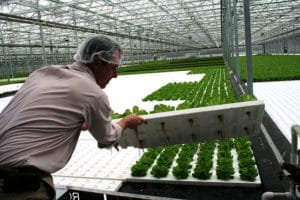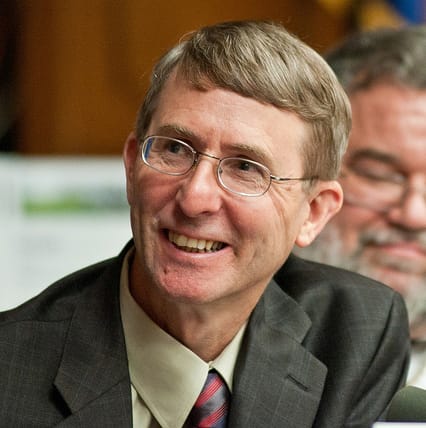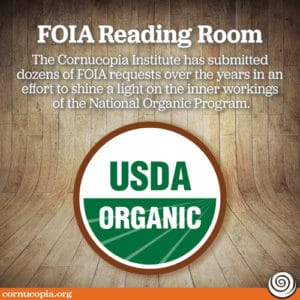[Read Cornucopia’s formal request to the USDA’s Office of Inspector General to investigate whether the agency willfully attempted to misinform the public.]
Regulators Bypass Expert Panel, Endorse Organic Practices Banned Worldwide
FOIA Documents, Witnesses Indicate Collusion, USDA Organic Program in Turmoil: Formal Complaint Filed with Office of Inspector General
 |
need only change the fertilizer solution to become certified organic Image source: Horticulture Group |
In an affront to the farming pioneers who launched the organic movement, today a $50 billion industry, the USDA announced late last month that the “Certification of hydroponic, aquaponic, and aeroponic operations is allowed under the USDA organic regulations, and has been since the National Organic Program (NOP) began.”
Much of the hydroponic production entering the organic market takes place in large, industrial-scale greenhouses using liquid fertilizers, mostly produced from conventional, hydrolyzed soybeans. Hydroponic produce under the organic label is rapidly displacing fruit and vegetables grown in soil, which is carefully nurtured to improve fertility, by diversified farms. The founders within the organic farming community contend that hydroponics’ cheaper production techniques, employed by huge growers in Mexico, Canada, and Europe, where hydroponics cannot be legally labeled as “organic,” is crushing legitimate soil-based farmers in the U.S.
There is no legal requirement for conventional or organic produce to be labeled as grown hydroponically, so consumers are likely unaware that the production methods, and corresponding nutrient levels, used in the fruits and vegetables they are purchasing have radically changed.
The USDA’s statement was made regardless of the fact that the National Organic Standards Board (NOSB), the governing body that the USDA Secretary is required by Congress to consult on all organic rulemaking, has never voted to legalize soil-less production.
The present federal organic regulations and their enabling legislation, the Organic Foods Production Act (OFPA), both require careful stewardship of soil fertility as a prerequisite for organic certification.
Despite the USDA’s claim that hydroponics has always been approved as part of organics, The Cornucopia Institute, a farm policy research group based in Wisconsin, has obtained numerous internal and external emails exchanged between NOP staff and certifiers expressing their understanding that soil-based production is required. These documents were procured through a Freedom of Information Act request and are dated as recently as 2016.
“The NOP has unilaterally, and in secret, allowed for the certification of soil-less systems without standards, public notice, or opportunity for public comment,” said The Cornucopia Institute’s senior scientist, Linley Dixon, PhD.
Since the seemingly erroneous official statement was released last month, there has been an outpouring of opposition from the organic farming community. Dr. Dixon said Cornucopia has received a flurry of inquiries from organic farmers surrounding the NOP’s statement, some of which called it an “outright lie,” while others referred to it as “a rewriting of history.” The current USDA standards went into effect in 2002.
The nonprofit farm policy research group sent a formal request to the USDA’s Office of Inspector General asking them to investigate whether officials within the agency willfully attempted to misinform the public.
Since 2005, a few organic accredited certifying agents (ACAs), catering to corporate agribusiness, have quietly certified hydroponic production systems based on the USDA’s public silence on the issue. The largest certifier in the country, CCOF in California, is the predominant certifier of hydroponic operations.
 |
Source: USDA |
Earlier this month, Miles McEvoy, the official who stealthily approved hydroponic production while running the NOP during the Obama administration, resurfaced as an official representative of CCOF at a national meeting of organic certifiers. McEvoy resigned from his position with the NOP in September 2017 under an ethical cloud, and has since been a speaker at prominent industry conferences focusing on large-scale organic production, including hydroponics.
Meanwhile, the divide in the organic industry has other ACAs choosing not to certify soil-less production systems, based on their straightforward interpretation of current regulatory requirements. To date, the NOSB has never formally made recommendations for how these soil-less systems might operate within the law, as Congress required.
There are several prominent ACAs that have never allowed the certification of soil-less systems and have a reputation for their high organic integrity in other regards, as well. These include OneCert, Vermont Organic Farmers, Maine Organic Farming and Gardening Association, Organic Crop Improvement Association, and Ohio Ecological Food and Farming Association.
Sam Welsch, the president of the USDA-accredited certifier OneCert, responded to NOP’s notice stating, “There are two parts to the NOP’s lie. The first is that hydroponic operations are allowed by the regulations. The second is when that was allowed. The certification of hydroponics was not even considered an option until September 2006 when the NOP sent certifiers a survey on the topic.”
FOIA documents indicate that, as of 2016, 41 ACAs had responded to a survey stating that they do not certify hydroponics, while only 18 ACAs said that they do.
Dixon referred to the NOP’s statement as “revisionist history” and said that The Cornucopia Institute currently has their legal team researching the filing of a federal lawsuit challenging the agency. The farmer outcry in response to NOP’s position signals that many certified organic growers do not believe that soil-less systems meet the organic standards.
“The USDA’s crude rewriting of history is in keeping with the Trump administration’s attitude towards reality. They seem to believe that if they say something loud enough, we will all believe it,” said Dave Chapman, a 40-year organic farming veteran who has been working to raise awareness around the corporate-hydroponic takeover of organics.
Chapman continued, “The clumsiness of this fake news reveals the current NOP’s disconnect from the organic community. They seem intent on pushing away the very people they were created to serve.”
The Perdue/Trump administration at the USDA has also recently come under fire for scuttling new benchmarks that would have made it easier to enforce animal welfare standards in organic livestock production. That, too, was viewed as an affront to organic stakeholders, as tens of thousands of farmers and consumers formally commented in support of the rulemaking after the NOSB voted unanimously for its adoption. The rules were set aside after heavy lobbying from a few giant, predominantly conventional, egg and poultry producers defending confinement practices.
Whether producing meat, milk, eggs, or produce, many certified organic farmers are becoming aware of the fact that the certifiers they employ are ultimately hurting their bottom line when they certify operations that skirt organic standards, regardless of what the NOP permits.
“More and more growers are recognizing that they are being placed at a competitive disadvantage by the very certifiers who we have been paying thousands of dollars to over decades, assuming they were defending the integrity of organic production,” said Tom Beddard of Lady Moon Farms, the largest organic grower east of the Mississippi with farms in Pennsylvania, Georgia, and Florida.
The USDA’s announcement comes on the heels of a year of controversy surrounding the regulatory agency’s oversight of the organic industry. A series of damaging investigative stories in The Washington Post highlighted allegedly illegal “factory farms” producing organic eggs and dairy products and the failure of the NOP to investigate and control illegal and fraudulent grain imports.
“It’s now more important than ever for organic consumers to do their homework, making sure they receive the safest, nutrient-dense food for their families while simultaneously rewarding the true heroes in the organic movement,” Dixon added.
The Cornucopia Institute maintains scorecards rating organic brands based on their legal/ethical approach to organic production.
MORE:
 According to Freedom of Information Act (FOIA) documents obtained by The Cornucopia Institute, NOP staff and some certifiers were still uncertain, as recently as 2013, that hydroponic operations were legally certifiable as organic even while other certifiers, including the nation’s largest, CCOF, were profiting by certifying many large operations.
According to Freedom of Information Act (FOIA) documents obtained by The Cornucopia Institute, NOP staff and some certifiers were still uncertain, as recently as 2013, that hydroponic operations were legally certifiable as organic even while other certifiers, including the nation’s largest, CCOF, were profiting by certifying many large operations.
NOP staff member Renee Mann was asked to respond to a question from a certifier and another NOP staff member seeking clarity on whether or not hydroponic operations could be certified as organic. In a 2013 email, Mann stated, “I don’t know … I seem to remember a time when the NOP said that hydroponic operations could not be certified because they could not meet the requirements for 205.203 (a‐c) to maintain or improve physical, chemical & biological aspects of soil.”
Another certifier contacted the NOP that same year, complaining that they were losing business because it was their understanding, from information provided to them previously by USDA regulators, that hydroponic operations were not eligible for certification. As a result, the hydroponic operators found other certifiers that were willing to deem their operations organic. The certifier called the situation “unfair” and requested additional information.
In addition to asking the OIG to investigate the intent to mislead the public on the legality of hydroponics and the history of the controversy at the NOP, Cornucopia has asked the independent agency watchdog to also look into the chronology of the former top organic regulator, Miles McEvoy, and his waltz through the proverbial revolving door to his current position with CCOF, the nation’s largest organic certifier. McEvoy previously was charged with directly overseeing all certifiers, including CCOF. It should also be noted that CCOF certifies, by far, more hydroponic operations than any other single accredited certifying agent and has profited handsomely from the decision McEvoy made to sidestep NOSB deliberation on the issue and, in a stealthy manner, allow certification of soil-less operations.
Recent high-profile scandals at the National Organic Program, including a series of critical investigative reports in The Washington Post profiling alleged illegal factory dairy and egg operations and fraudulent imports, along with a damning audit by the OIG, immediately preceded McEvoy’s “retirement.”
Furthermore, reports illustrate that during the last years of his tenure, the NOP was a program in crisis, with attrition reducing the staff from approximately 45 down to the current 35.
That staff reduction took place in a program that was already thought to be seriously understaffed, given the magnitude of supervising a $50 billion global industry. “Exacerbating the problem was the unwillingness of Mr. McEvoy to make NOP enforcement documents public and legally fighting their release when receiving requests under the Freedom of Information Act. He had previously stated that over 10% of the diminished staff (four staff members) were strictly involved in reviewing and releasing FOIA documents,” said Mark Kastel, Cornucopia’s senior farm policy analyst.
Many industry observers and certifiers claim organic certification of hydroponic production systems violates several sections of the Organic Foods Production Act of 1990 (OFPA), especially §6513(b)(1):
“An organic plan shall contain provisions designed to foster soil fertility, primarily through the management of the organic content of the soil through proper tillage, crop rotation, and manuring.”
The final NOP rule, adopted under OFPA, and effective in late 2002, mentions soil over fifty times, affirming the central role of soil in cycling organic matter, a practice that is fundamental to organic agriculture.
“The operative legal question is, ‘How can you foster soil fertility without soil?’” stated Cornucopia’s Kastel.
The Cornucopia Institute brought up one final concern in their communication with the Office of Inspector General: the current vacancy on the National Organic Standards Board.
Dr. Francis Thicke, a past board leader who has aggressively challenged the legality of certifying hydroponic production, left the board when his five-year term expired at the end of January. The official posting in the Federal Register announcing nominations to fill the vacancy stated that the term of the new NOSB replacement would commence on January 24, 2018.
It is the contention of The Cornucopia Institute that Congress carefully designated certain seats on the NOSB to assure diversity in knowledge for decision-making by the board (the one held by Thicke was for a conservationist). The organic industry watchdog contends that, based on the clear Congressional intent for seats held by specific industry stakeholders, no official business can transpire without a full complement of members. It is hoped that this deficiency will be resolved before the NOSB’s next official meeting in Tucson, Arizona this April, forestalling potential legal action.

